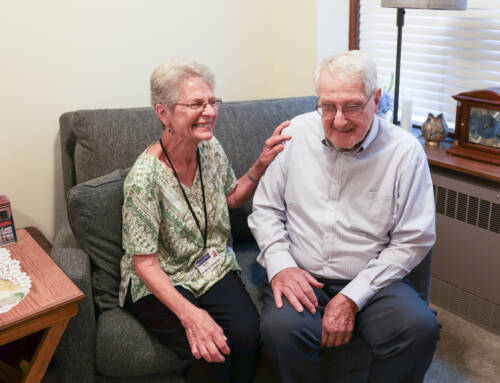Imagine having dinner plans with your spouse, and you get a call from your parent’s temporary caregiver right after you leave the house: your parent has fallen and cut their arm, but they have no broken bones and will be fine. You cancel dinner and rush over to make sure they’re okay and spend the evening with them.
You know you would feel guilty if you still went to dinner and then went to see your parent later, but now you feel guilty for canceling dinner with your spouse. You know you shouldn’t feel guilty because there’s nothing you could have done to stop them from falling, but you’re stuck with this uncomfortable feeling of being caught in the middle.
There are certain steps you can take if you want to manage these feelings of guilt and be able to allow other caregivers to take over for a night. Below are four steps that will help you examine your feelings of guilt and resolve them in a healthy way.
- Recognize feelings of guilt when they arise. Sometimes guilt is very pressing in your mind and comes from a situation like the example above. Other times, it may manifest as a nagging feeling that you should be doing more, but you’re not quite sure what. This can lead to stress and an over active mind because you are constantly trying to find a solution. The first step is to recognize it as guilt and confront it head on by identifying the cause of the feeling.
- Don’t strive for guilt-free caregiving. Guilt is a feeling we all experience, and there’s no way to avoid it; it’s what we do with those feelings that matters. Understand and accept that you have limitations. Oftentimes, caregiving is one of many roles people play congruently. Set boundaries, and find ways to maintain and support them while ensuring your loved one is cared for, even if it must be by someone else you trust.
- Realize you need to take care of yourself. You don’t need to feel guilty for taking a day off for yourself every once in a while. You must have confidence and peace of mind that everything will be okay. Realize it’s not your fault even if something small does happen, because you cannot control everything.
- Examine how caregiving is affecting your emotions. Caregiver guilt can stem from more than just taking a day off. You may feel guilty about feeling resentful, disgusted or frustrated about some aspects of caregiving. Certain aspects of caregiving are private and may be out of your normal comfort zone. Those feelings, along with guilt, are natural and need to be handled in a healthy way. Ask questions. Are there areas where you struggle more than others? What resources are available to you to help cope with these feelings?
If you are struggling to manage these feelings yourself, it may be helpful to join a local support group or counseling service. Masonic Village offers caregiver support groups and other resources like home care services to support the assistance you are providing your loved one.




